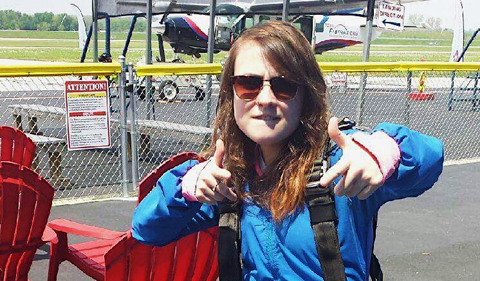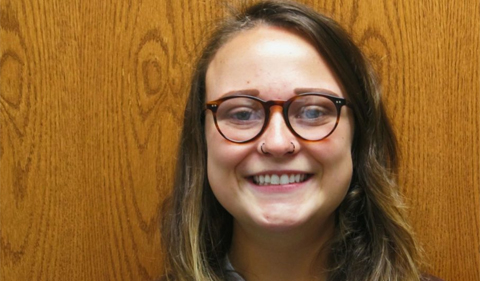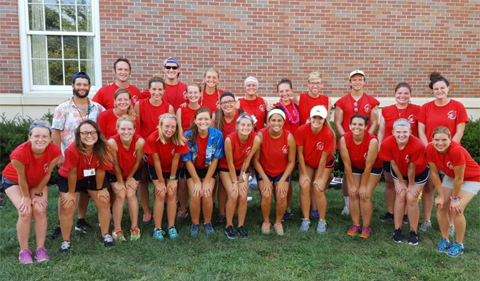
Psychology student Megan Credit
by Kristin Distel
Rising senior Megan Credit ’18 has always been interested in the human mind and mental illness. At Ohio University, she has found the resources and guidance needed to achieve her goals and become a budding professional in the field of clinical psychology.
In part, Credit attributes her success to the stimulating coursework. Dr. Gary Sarver’s Clinical & Counseling class as well as Abnormal Psychology, she explains, touched on everything that one would experience in an actual clinical setting. Dr. Brian Wymbs’s Psychological Disorders of Childhood course was also a major milestone in Credit’s studies.
Additionally, Credit has received remarkable undergraduate research and professional development opportunities at The Center for Intervention Research in Schools (CIRS) laboratory that were available to her as an OHIO research assistant in the Psychology Department.

OHIO Senior Megan Credit
Guidance and Mentorship from Faculty Members
A good relationship with her adviser and professors also has been fundamental to Credit’s success at OHIO.
“Dr. Susan Tice-Alicke has taken me under her wing,” Credit says. “She helped me figure out which path to take in terms of a specialization, and she suggested classes within and outside of psychology that I might enjoy.”
She also cites Dr. Julie Owens and Dr. Steve Evans, co-directors for the Center for Intervention Research in Schools, as invaluable mentors.
“They are teaching me strong research and writing skills, and they have provided me with the opportunity to engage in real life clinical assessments, which one does not get to experience in the classroom setting,” she states. Owens and Evans also have provided guidance on the graduate school application process. For Credit, who wants to earn a Ph.D. in clinical psychology, this advice has been timely and useful.
“They are always willing to talk with students about graduate school, preparing for the GRE, and even concerns outside of school and work. They are not only professors but also advisers, coaches, and mentors.”
Many Opportunities for Hands-On Research
Credit has taken advantage of every opportunity OHIO has to offer its psychology students, especially in terms of undergraduate research and clinical training.
Her first taste of working for the CIRS lab began with assisting Wymbs with the couples study he is conducting at OHIO. In addition to helping Credit meet other faculty members and students in the department, working on this study gave Credit her initial research experience.
“I give credit to Dr. Wymbs for getting me started in the lab,” she explains. “I conducted assessments, looked at teens’ responses, and considered what role ADHD plays in relationships. Most of what I do in the lab pertains to ADHD.” Credit has further worked alongside Brian Wymbs and Dr. Frances Wymbs as a Camp Boost counselor; this year, Credit notes, she will serve as a lead counselor.

Camp Boost is staffed by OHIO students and led by Drs. Fran and Brian Wymbs.
She is currently part of many projects in CIRS lab, where she conducts research under the direction of Drs. Owens and Evans. Within the CIRS lab, Credit is also part of the Project to Learn about Youth (PLAY). As part of the research project, she visited Lancaster City Schools and conducted evaluations on students and their parents.
Credit’s duties during the evaluations consisted of holding structured parent interviews, in addition to administering instruments such as the Wechsler Abbreviated Scale of Intelligence (WASI-II) with students. The PLAY project helps researchers to better understand how many students in grades K-12 have social, emotional, and behavioral problems. The evaluation also helps determine the variety of services that students with these problems receive, and it helps to mitigate the issues that make it difficult to use such services.
Credit’s PLAY research provided an opportunity for her to present her work on a national stage. She created a poster that was accepted into the School of Mental Health conference in Washington, D.C. Credit was the lead author on this poster, while OHIO alum and current graduate student Paige Coy ’17 served as the second author.
In Spring 2017, Credit was also part of the Developing Tools to Assess Student Behavior project (IFAB).
The goal of this project, she explains, is to pinpoint the most effective and time-efficient way for teachers to assess students’ behavior. Credit visited participating school districts and monitored teachers’ results on student behavior. “The result for the completed questionnaires will help teachers measure changes in student behavior,” she explains.
Additionally, she has contributed to a variety of other projects, always with an eye toward helping others and enhancing her own skills.
She is currently on the Bridges to Educational Success for Teens (BEST) project, for which she drafted a written amendment for the project’s institutional review board review. Credit also is working on a project with Evans, who directs The Society for the Study of School Psychology (SSSP).
“SSSP is a side project I have been working on alongside Dr. Evans and is a non-profit organization that promotes research, scholarship and communication in school psychology. SSSP provides grant funding to three different levels of school psychology researchers (students working on their dissertation, psychologists just beginning their career, and psychologists who are considered to be in the midst of their career), as well as international faculty who aim to globalize school psychology,” Credit explains.
Her contribution to this work involves frequent meetings with Evans, editing the user manual, and creating organized databases that provide information on the awardees. The grant, which is given to school psychologists, considers the psychologists’ research and its relevance to the larger field of psychology, as well as how it will benefit school psychology research more specifically.
An Eye Toward the Future
“Ideally,” Credit says, “I want to get my doctoral degree. In terms of a specialization, I am interested in how parents affect their children, especially within the LGBTQ community. I’m considering clinical work, research, and teaching—and all of these are possible with a Ph.D.”



















Comments